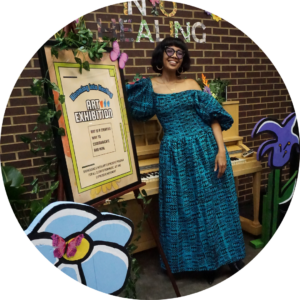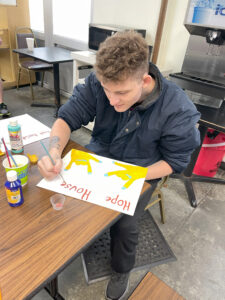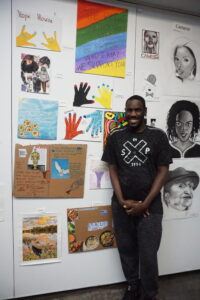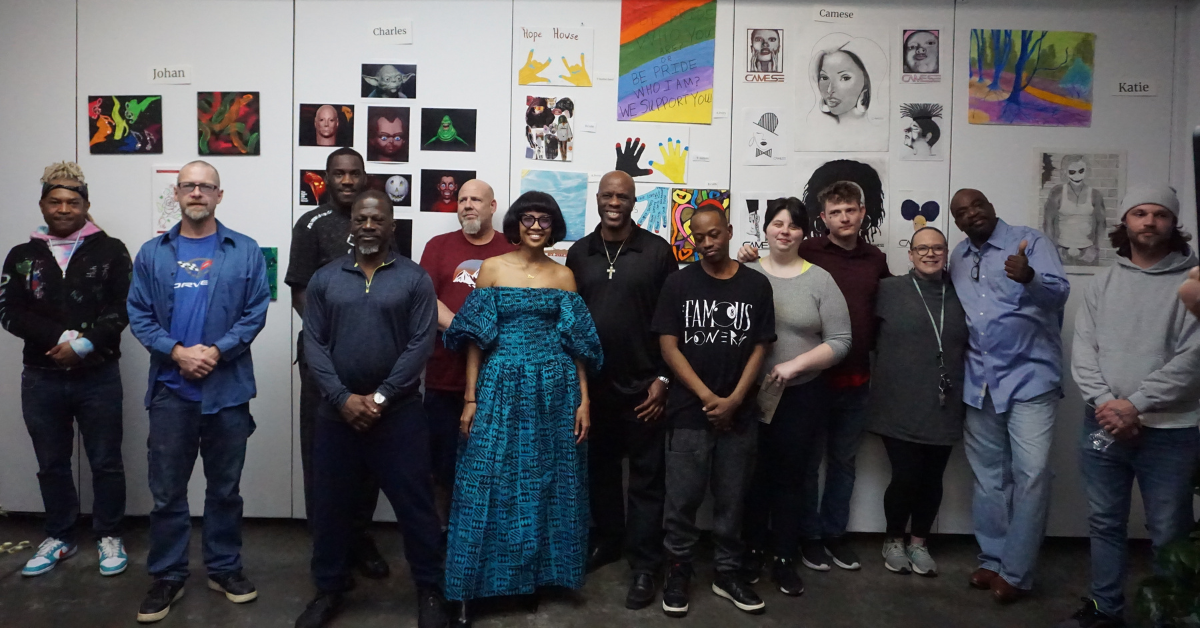Healing Through Art
Breaking the cycle of homelessness requires healing: healing from past traumas, healing from self-doubt, and for many, healing from the physical and emotional effects of substance addiction.

Chari Chin-Young Caston
But what does healing look like for the men who stay at Hope House, CaringWorks’ 70-bed supportive housing and residential treatment facility located in downtown Atlanta?
Thanks to Chari Chin-Young Caston, a Hope House clinical intern who is earning a master’s degree in social work from the University of Georgia, healing is happening through art. Chari recently completed an art program that she designed and led for about 10 Hope House clients, including more than half who are in the Deaf Bridges to Recovery program for clients who are deaf, hard of hearing, deaf-blind, deaf plus or late-deafened.
It all started several months ago when Chari was going through satisfaction surveys among clients getting treatment at Hope House. Clients said they wanted more hands-on opportunities to express themselves and to interact with each other.

“I asked myself, ‘What is something that our Deaf Bridges to Recovery clients and our hearing clients can come together to do and communicate?’ Art was the first thing that came to mind.”
A self-described “creative,” Chari said she wanted to design a program that could be tailored for clients of all artistic abilities.
“I decided to put together a five-week expressive art experience. Sometimes when people see art happening, they may feel intimidated, because they may feel like, ‘I’m not a painter; I can’t draw, or I don’t know how to write well.’ But that wasn’t the purpose of this program.”
Chari named the program, “Expressive Recovery for All” and said the purpose was to “harness the power of expressive arts to foster self-reflection, creativity, and positive storytelling in the journey to healing from substance use.”
Before designing the program, she noticed that the Deaf Bridges to Recovery clients and other Hope House clients didn’t often communicate with each other, so she set out to build a curriculum that would foster a greater sense of community among all participants.

“I just really wanted to create a space where they could create together, and maybe not necessarily speak the same language as far as hearing and non-hearing, but speak the same language as far as art goes.”
Through guided classes using all types of art mediums including painting, drawing, vision boards, poetry, and music, and with ASL interpreters to facilitate communication, Chari created an engaging and interactive program that clients loved.
“We had an amazing group dynamic. Participants fed and fueled each other; sharing things with each other that they hadn’t talked about before.”
For a couple of the participants like Shelby C., the experience re-ignited a prior passion for art.
“I didn’t have time for art in my addiction,” he said. “I put everything down for the drug. But I fell in love with art again.”

But Chari says that most of the participants hadn’t considered themselves artists before, and the program gave them a chance to experience for the first time how they can be artistic, and how therapeutic art can be.
“One of the biggest things I heard when we started this was, ‘But I’m not an artist.’ And I told them, ‘You are an artist. You are the author of your own life and you can paint all the vision that you want whether it’s with a colorful paint brush, with your hands, with clay, or with by simply being yourself.’”
At the end of the five-week program, Chari organized an art show for clients to showcase their work. Clients received program completion certificates and shared with attendees about their experience and the impact it had.
“It’s really made me feel proud of myself,” said Hope House client Anthony P. “And I really hope this continues.”

Help more people break the cycle of homelessness.
About CaringWorks:
Built on the single idea that all people—no matter their social or economic standing—should have a chance to improve their quality of life, CaringWorks has served thousands of clients throughout our 20-plus-year history. Since our inception, we have grown exponentially to become one of Georgia’s leaders in providing permanent supportive housing. We serve hundreds of individuals each year through unique programs and services that are specifically tailored to the needs of those facing chronic homelessness.
Donate today to help us end homelessness.
April 2024
